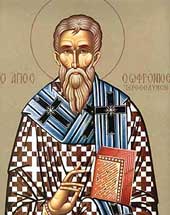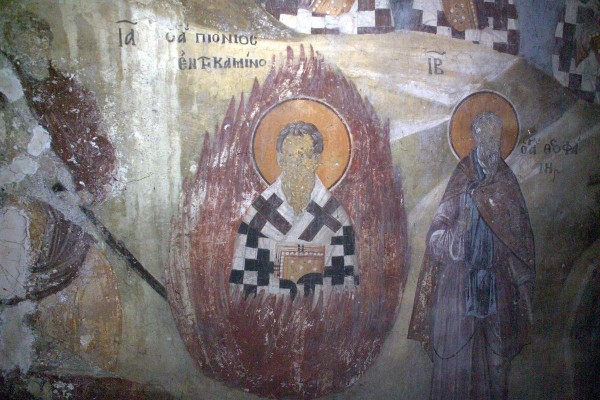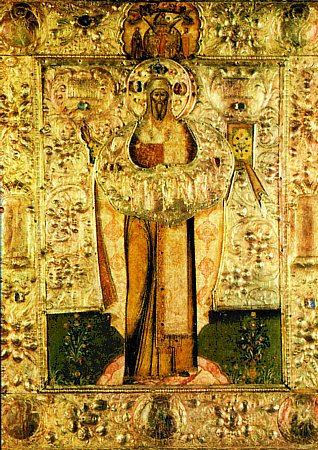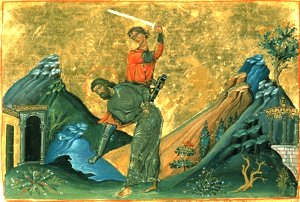|
|
St Sophronius, Patriarch of Jerusalem He was born in Damascus of eminent parents. Having acquired worldly wisdom, he was not content with this, and began also to acquire pure, spiritual wisdom. In the monastery of St Theodosius he found himself with the monk John Moschus, whom he took as his teacher; then, together with him, set out to visit the monasteries and ascetics of Egypt. Their motto was to glean more spiritual wisdom each day. They wrote down all that they discovered, and later published it in two books entitled "The Spiritual Meadow". They later went to Rome, where Moschus died, leaving Sophronius with the pledge to take him either to Sinai or to the Monastery of St Theodosius. Sophronius fulfilled the desire of his teacher and took his body to the monastery, after which he was delayed in Jerusalem, which by that time had been freed from the Persians. He witnessed the return of the Precious Cross from Persia, which the Emperor Heraclius carried into the Holy City on his back. The old Patriarch, Zacharias, who also returned from slavery, did not live long and, when he went to the other world, was followed first by Modestus, who died in 634, and then by blessed Sophronius. He governed the Church with outstanding wisdom and zeal for four years, standing in defence of Orthodoxy against the Monothelite heresy, which he condemned at his Council in Jerusalem before it was condemned at the 6th Ecumenical Council. He wrote the life of St Mary of Egypt, compiled the rite of the Great Blessing of Water and introduced various new hymns and songs into different services. When the Arabian Caliph Omar captured Jerusalem, Sophronius begged him to spare the Christians, which Omar hypocritically promised. When Omar quickly began to plunder and ill-treat the Christians in Jerusalem, Sophronius, with many lamentations, begged God to take him from among the living upon earth, that he should not see the desecration of the holy places. And God heard his prayer, and took him to Himself in His heavenly courts in 644. He was born in Damascus of eminent parents. Having acquired worldly wisdom, he was not content with this, and began also to acquire pure, spiritual wisdom. In the monastery of St Theodosius he found himself with the monk John Moschus, whom he took as his teacher; then, together with him, set out to visit the monasteries and ascetics of Egypt. Their motto was to glean more spiritual wisdom each day. They wrote down all that they discovered, and later published it in two books entitled "The Spiritual Meadow". They later went to Rome, where Moschus died, leaving Sophronius with the pledge to take him either to Sinai or to the Monastery of St Theodosius. Sophronius fulfilled the desire of his teacher and took his body to the monastery, after which he was delayed in Jerusalem, which by that time had been freed from the Persians. He witnessed the return of the Precious Cross from Persia, which the Emperor Heraclius carried into the Holy City on his back. The old Patriarch, Zacharias, who also returned from slavery, did not live long and, when he went to the other world, was followed first by Modestus, who died in 634, and then by blessed Sophronius. He governed the Church with outstanding wisdom and zeal for four years, standing in defence of Orthodoxy against the Monothelite heresy, which he condemned at his Council in Jerusalem before it was condemned at the 6th Ecumenical Council. He wrote the life of St Mary of Egypt, compiled the rite of the Great Blessing of Water and introduced various new hymns and songs into different services. When the Arabian Caliph Omar captured Jerusalem, Sophronius begged him to spare the Christians, which Omar hypocritically promised. When Omar quickly began to plunder and ill-treat the Christians in Jerusalem, Sophronius, with many lamentations, begged God to take him from among the living upon earth, that he should not see the desecration of the holy places. And God heard his prayer, and took him to Himself in His heavenly courts in 644.The Holy Martyr Pionius A priest of Smyrna, he suffered there in the time of Decius"s persecution. They condemned him to be crucified, which was a great joy to him. And as soon as the soldiers assembled the cross and laid it on the ground, Pionius laid himself on it and stretched out his arms, calling to the soldiers to put the nails into his hands. The cross was inserted into the ground upside down, and a fire lit under the martyr"s head. There were many bystanders. Pionius closed his eyes and prayed to God within himself. The flames could not succeed in igniting even his hair, and when the fire had at last gone out and everyone thought that he was dead, Pionius opened his eyes and cried out joyfully: "O Lord, receive my spirit!", and breathed his last. This saint wrote the life of St Polycarp of Smyrna, together with whom he now makes merry in the Kingdom of Christ. He suffered and was glorified in 250. A priest of Smyrna, he suffered there in the time of Decius"s persecution. They condemned him to be crucified, which was a great joy to him. And as soon as the soldiers assembled the cross and laid it on the ground, Pionius laid himself on it and stretched out his arms, calling to the soldiers to put the nails into his hands. The cross was inserted into the ground upside down, and a fire lit under the martyr"s head. There were many bystanders. Pionius closed his eyes and prayed to God within himself. The flames could not succeed in igniting even his hair, and when the fire had at last gone out and everyone thought that he was dead, Pionius opened his eyes and cried out joyfully: "O Lord, receive my spirit!", and breathed his last. This saint wrote the life of St Polycarp of Smyrna, together with whom he now makes merry in the Kingdom of Christ. He suffered and was glorified in 250.Our Holy Father George the SinaiteAbbot of Mount Sinai, he was a great ascetic and a righteous man. On Easter night an angel of God carried him to Jerusalem for the service, and took him back the same day to Sinai. He entered peacefully into rest in the 6th century.
Venerable George the New, wonderworker of Constantinople (970
St Euthymius the Bishop of Novgorod Saint Euthymius, in Baptism John, was born in answer to the fervent prayers of the presbyter Micah and his wife Anna. For many years they had been childless, and they vowed that if they had a son, they would dedicate him to God. The boy read priestly books and frequently attended church services, often helping his father in the small church of St Theodore. All this sanctified young John’s soul. In the year 1411, he left his parental home for a monastery at the age of fifteen... Saint Euthymius, in Baptism John, was born in answer to the fervent prayers of the presbyter Micah and his wife Anna. For many years they had been childless, and they vowed that if they had a son, they would dedicate him to God. The boy read priestly books and frequently attended church services, often helping his father in the small church of St Theodore. All this sanctified young John’s soul. In the year 1411, he left his parental home for a monastery at the age of fifteen...Translation of the relics of Martyr Epimachus of Pelusium to Constantinople (250) The Holy Martyr Epimachus of Alexandria was a native of Egypt. For a long time he lived in seclusion on Mount Peleusium. During a persecution against Christians at Alexandria (about the year 250), St Epimachus in his fervent zeal came into the city, destroyed pagan idols, and fearlessly confessed Christ. For this the saint was put to torture. Among the people watching the torture was a woman who was blind in one eye. A drop of blood from the martyr healed her infirmity.
After fierce tortures, the saint was beheaded by the sword.
Today we commemorate the translation of the relics of St Epimachus. The Holy Martyr Epimachus of Alexandria was a native of Egypt. For a long time he lived in seclusion on Mount Peleusium. During a persecution against Christians at Alexandria (about the year 250), St Epimachus in his fervent zeal came into the city, destroyed pagan idols, and fearlessly confessed Christ. For this the saint was put to torture. Among the people watching the torture was a woman who was blind in one eye. A drop of blood from the martyr healed her infirmity.
After fierce tortures, the saint was beheaded by the sword.
Today we commemorate the translation of the relics of St Epimachus.St. Theodora, queen of Arta, wife of Despot Michael II of Epirus (1275)
|